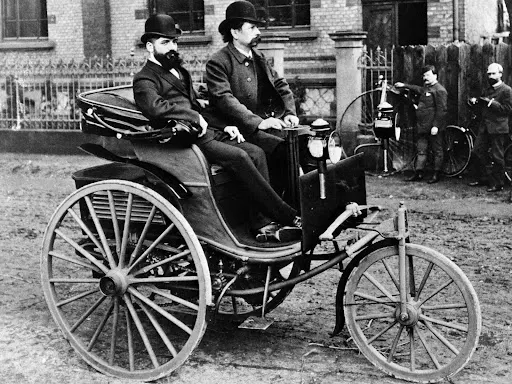Daimler, Maybach and Benz introduce the first practical gasoline-engine automobile.
It is difficult, if not impossible, to imagine a world without the motorcar. When German engineer Karl Benz ( 1844-1929 ) drove a motorcar tricycle in 1885 and
 |
Karl Benz |
fellow Germans Gottlieb Daimler (1834-1900) and
Wilhelm Maybach (1846-1929) converted a horse-drawn carrige into a four-wheeled motorcar in August 1886,
none of them could have foreseen the effects of their new invention.
Benz recognized the great potential of petrol as a fuel. His three-wheeled car had a top speed of just ten miles (16 km) per hour with its four-stroke, one cylinder engine. After receiving his patent in January 1886, he began selling the Benz Velo, but the public doubted it's reliability.
Benz's wife Bertha had a brilliant idea to advertise the new car. In 1888 she took it on a 60-mile (100 km) trip from Mannheim to near Stuttgart. Despite having to push the car up hills, the success of the journey proved to a skeptical public that this was a reliable mode of transport.
Daimler and Maybach did not produce commercially feasible cars until 1889. Initially the German inventions did not meet with much demand, and it was French companies like Panhard et Levassor that redesigned and popularized the automobile.
In 1926 Benz's company merged to form the Daimler-Benz company. Benz had left his company in 1906 and, remarkably, he and Daimler never met. Due to higher incomes and cheaper, mass-produced cars, the United States led in terms of motorization for much of the twentieth century.
This kind of movement has, however, come at a cost. Some 25 million people are estimated to have died in car accidents worldwide during the twentieth century. Climate-changing exhaust gases and suburban sprawl are but two more of the consequences of a heavy reliance on the automobile.
" If I had asked people what they wanted, they would have said faster horses." — Henry Ford.













No comments:
Post a Comment